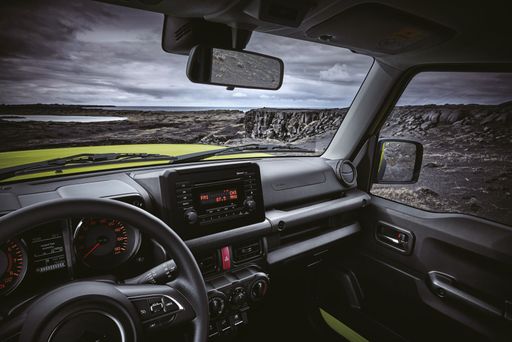Suzuki Jimny vs Toyota Yaris - Differences and prices compared
Compare performance (102 HP vs 280 HP), boot space and price (25300 £ vs 21900 £ ) at a glance. Find out which car is the better choice for you – Suzuki Jimny or Toyota Yaris?
Costs and Efficiency:
Looking at overall running costs, both models reveal some interesting differences in everyday economy.
Toyota Yaris has a a bit advantage in terms of price – it starts at 21900 £ , while the Suzuki Jimny costs 25300 £ . That’s a price difference of around 3420 £.
Fuel consumption also shows a difference: Toyota Yaris manages with 3.80 L and is therefore clearly more efficient than the Suzuki Jimny with 7.70 L. The difference is about 3.90 L per 100 km.
Engine and Performance:
Power, torque and acceleration are the classic benchmarks for car enthusiasts – and here, some clear differences start to show.
When it comes to engine power, the Toyota Yaris has a decisively edge – offering 280 HP compared to 102 HP. That’s roughly 178 HP more horsepower.
In acceleration from 0 to 100 km/h, the Toyota Yaris is decisively quicker – completing the sprint in 5.50 s, while the Suzuki Jimny takes 12.80 s. That’s about 7.30 s faster.
In terms of top speed, the Toyota Yaris performs distinct better – reaching 230 km/h, while the Suzuki Jimny tops out at 145 km/h. The difference is around 85 km/h.
There’s also a difference in torque: Toyota Yaris pulls convincingly stronger with 390 Nm compared to 130 Nm. That’s about 260 Nm difference.
Space and Everyday Use:
Cabin size, boot volume and payload all play a role in everyday practicality. Here, comfort and flexibility make the difference.
Seats: Toyota Yaris offers decisively more seating capacity – 5 vs 2.
In curb weight, Toyota Yaris is barely noticeable lighter – 1090 kg compared to 1165 kg. The difference is around 75 kg.
In maximum load capacity, the Toyota Yaris performs minimal better – up to 935 L, which is about 72 L more than the Suzuki Jimny.
When it comes to payload, Toyota Yaris significantly takes the win – 525 kg compared to 270 kg. That’s a difference of about 255 kg.
Who wins the race?
The Toyota Yaris proves to be wins the duel decisively and therefore becomes our DriveDuel Champion!
Toyota Yaris is the better all-rounder in this comparison.

Toyota Yaris
Costs and Consumption
View detailed analysis
Engine and Performance
View detailed analysis
Dimensions and Body
View detailed analysis
Suzuki Jimny
Brimming with raucous charm and unabashed off-road spirit, the Suzuki Jimny makes light work of rough tracks while remaining surprisingly at home in city streets. It's a cheeky, no-nonsense companion for buyers who prefer character over conformity — think go-anywhere attitude in a pocket-sized package.
details



Toyota Yaris
The Toyota Yaris is a sprightly city hatch that packs clever packaging, surprising comfort and fuel-sipping manners into a neat, easy-to-park package. It rewards sensible buyers with low running costs, friendly ergonomics and a forgiving drive, delivered with Japanese reliability and just enough personality to make errands feel a little less ordinary.
details

Costs and Consumption |
|
|---|---|
|
Price
25300 - 27700 £
|
Price
21900 - 46700 £
|
|
Consumption L/100km
7.70 L
|
Consumption L/100km
3.8 - 9.5 L
|
|
Consumption kWh/100km
-
|
Consumption kWh/100km
-
|
|
Electric Range
-
|
Electric Range
-
|
|
Battery Capacity
-
|
Battery Capacity
-
|
|
co2
173 g/km
|
co2
87 - 215 g/km
|
|
Fuel tank capacity
40 L
|
Fuel tank capacity
36 - 50 L
|
Dimensions and Body |
|
|---|---|
|
Body Type
Off-Roader
|
Body Type
Hatchback
|
|
Seats
2
|
Seats
4 - 5
|
|
Doors
3
|
Doors
3 - 5
|
|
Curb weight
1165 kg
|
Curb weight
1090 - 1356 kg
|
|
Trunk capacity
-
|
Trunk capacity
141 - 286 L
|
|
Length
3645 mm
|
Length
3940 - 3995 mm
|
|
Width
1645 mm
|
Width
1745 - 1805 mm
|
|
Height
1705 mm
|
Height
1455 - 1500 mm
|
|
Max trunk capacity
863 L
|
Max trunk capacity
935 L
|
|
Payload
270 kg
|
Payload
289 - 525 kg
|
Engine and Performance |
|
|---|---|
|
Engine Type
Petrol
|
Engine Type
Full Hybrid, Petrol
|
|
Transmission
Manuel
|
Transmission
Automatic, Manuel
|
|
Transmission Detail
Manual Gearbox
|
Transmission Detail
CVT, Manual Gearbox, Automatic Gearbox
|
|
Drive Type
All-Wheel Drive
|
Drive Type
Front-Wheel Drive, All-Wheel Drive
|
|
Power HP
102 HP
|
Power HP
116 - 280 HP
|
|
Acceleration 0-100km/h
12.80 s
|
Acceleration 0-100km/h
5.5 - 9.7 s
|
|
Max Speed
145 km/h
|
Max Speed
175 - 230 km/h
|
|
Torque
130 Nm
|
Torque
390 Nm
|
|
Number of Cylinders
4
|
Number of Cylinders
3
|
|
Power kW
75 kW
|
Power kW
85 - 206 kW
|
|
Engine capacity
1462 cm3
|
Engine capacity
1490 - 1618 cm3
|
General |
|
|---|---|
|
Model Year
2021 - 2024
|
Model Year
2024 - 2025
|
|
CO2 Efficiency Class
F
|
CO2 Efficiency Class
B, G
|
|
Brand
Suzuki
|
Brand
Toyota
|
What drivetrain options does the Suzuki Jimny have?
The Suzuki Jimny is offered with All-Wheel Drive.




